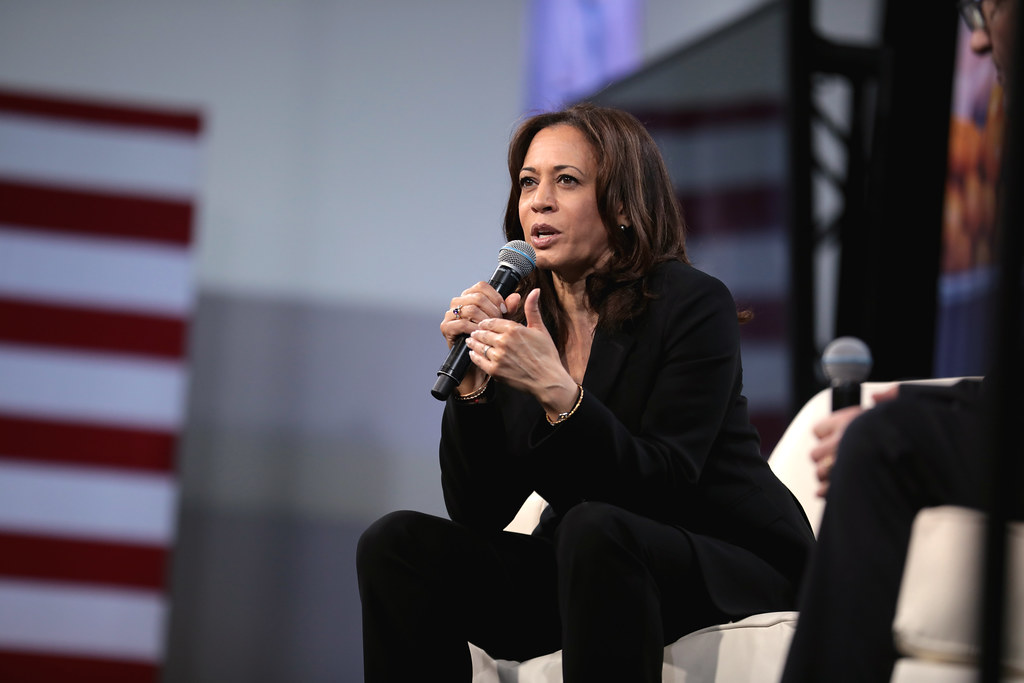
In a recent interview with Telemundo, Vice President Kamala Harris reaffirmed her support for the Latino community by emphasizing her pragmatic approach to capitalism. During the interview on Tuesday, Harris countered claims from former President Donald Trump, who has tried to paint her as a Marxist. Instead, she presented herself as a leader who supports private sector growth and small business development, particularly for Latino entrepreneurs.
“I am a capitalist. I am a pragmatic capitalist,” Harris said during the interview, which took place at the vice president’s official residence in Washington, D.C.’s Naval Observatory. She added that her vision for the country includes fostering a new generation of leadership that actively collaborates with the private sector. Harris emphasized her goal of building new industries and supporting small business owners, while also focusing on expanding opportunities for homeownership.
Trump’s Attacks
Harris’s remarks come as a direct response to the narrative that Republicans, and particularly Trump, have been pushing for years. The former president, during his campaign rallies and fundraising efforts, frequently refers to the vice president as “Comrade Kamala” and accuses her of being a Marxist. He has shared images on social media purporting to show Harris at a communist event, though the images are fake.
In an interview with Julio Vaqueiro, an anchor for Telemundo (a Spanish-language network owned by the same parent company as NBC News), Harris was asked to define her ideological stance in light of these attacks. The vice president dismissed Trump’s portrayal of her as inaccurate, instead labeling herself as a capitalist with a pragmatic approach to growing the American economy.
Economic Challenges for Latino Men
During the interview, Harris specifically addressed the economic challenges faced by Latino men, an increasingly important demographic in the upcoming presidential election. “I am very aware of how my economic agenda will affect Latino men,” she said. Harris acknowledged that many Latino men face significant barriers in accessing big loans from large financial institutions. These obstacles, she noted, often stem from a lack of relationships within the banking sector, rather than from a lack of qualifications.
To address these disparities, Harris explained her commitment to bringing more capital to community banks. These institutions, she argued, have a better understanding of the Latino community and are more likely to offer loans that larger banks might not provide. “We need to make sure these loans are available to people who deserve them,” she said, signaling her focus on building a more inclusive financial system.
Young men of color, particularly Latino men, have become a pivotal demographic in this election. Historically leaning toward Democrats, this group is now seeing unexpected inroads made by Trump’s campaign. The former president’s populist message has resonated with certain segments of the Latino community, particularly men who feel left behind by traditional politics.
Harris, however, is pushing back by emphasizing economic policies aimed at reducing inequality and expanding opportunities. One of her key initiatives, which she highlighted in the interview, is her plan to offer a $25,000 down payment assistance for first-time homebuyers. While the program is designed to benefit all Americans, Harris acknowledged the outsized impact it could have on the Latino community, where homeownership rates lag behind the national average.
“I am also aware of the specific impact on the Latino community,” Harris said, referring to her housing policy. By addressing key issues like access to capital and homeownership, Harris is hoping to attract Latino voters who are still undecided in the race.
A Tight Race Ahead
As the election approaches, polls show that the race between Harris and Trump is exceedingly close. With just two weeks to go before the Nov. 5 election, both candidates are within the margin of error in battleground states, as well as in national polls. This tight competition has made Latino voters an even more critical demographic, particularly in key swing states like Florida, Arizona, and Nevada, where Latino communities make up a significant portion of the electorate.
In addition to discussing Latino-specific economic challenges, Harris used the interview to outline her broader vision for the American economy. She stressed the importance of working with the private sector to create jobs and stimulate innovation, while also ensuring that economic growth benefits all Americans, not just the wealthy or well-connected.
Harris noted that her administration would work to ensure fairness in the financial system, reducing barriers to entry for minority-owned businesses and encouraging entrepreneurial growth. She argued that building new industries and supporting small businesses are essential components of a strong, sustainable economy.
In her closing remarks, Harris reiterated that her focus is on making sure all Americans have the opportunity to thrive economically. “We need leadership that understands how to partner with the private sector to build the new industries of tomorrow, while also ensuring that no one is left behind,” she said.
As the 2024 election approaches, Vice President Kamala Harris is positioning herself as a pragmatic capitalist who is deeply committed to supporting Latino entrepreneurs and addressing the unique economic challenges faced by minority communities. Her message stands in stark contrast to Trump’s portrayal of her as a Marxist, as she pushes policies aimed at fostering private sector growth, expanding access to capital, and increasing homeownership among Latinos.
With the race tightening in the final weeks before the election, Harris’s ability to connect with Latino voters could prove decisive in several key battleground states.
Featured image credit: Gage Skidmore via Flickr
Follow us for more breaking news on DMR
